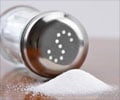In a new, unique study conducted on babies and birth weight, it has been found that smaller babies with low birth weight display an increased liking for salt. The results of the present study may serve to explain why certain individuals include more salt in their diet than others.
The study was conducted among 80 healthy babies, weighing atleast 2.5 kg. These babies were given both plain and salt water soon after birth in two separate bottles. The amount of salt water the babies drank was compared to the plain water consumption.Surprisingly, the preference for saltwater was found to be inversely related to their birth weight. Babies with low birth weight showed an increased acceptance of salt-water solutions than babies with increased birth weight, which showed tendency to reject salt water.
A follow up study was conducted on the same group, when they had reached preschool age. Surprisingly, the same effect was observed in the study participants with regard to preference for salt. This perhaps throws light on the fact that individual preference for taste could be predetermined, more so in utero.
Similar effects were not observed for sweet or other forms of taste, leading to a definitive conclusion that acceptance of salt is definitely linked to birth weight. "The early appearance of this relationship suggests that developmental events occurring in utero may have a lasting influence on an individual's preference for salty taste", according to lead author Leslie Stein.
Early childhood is regarded to a critical age for the formation of preferences for flavor and food. That is why most grandmothers feed children variably so that they will get adapted to the new taste without any difficulty.
The researchers further intend to explore the individual differences in liking for salty taste, and hope to obtain needed insights into the underlying factors driving salt preference and intake. Perhaps, individuals with high blood pressure could even use the results of the experiment for more effective strategies to reduce salt intake.







